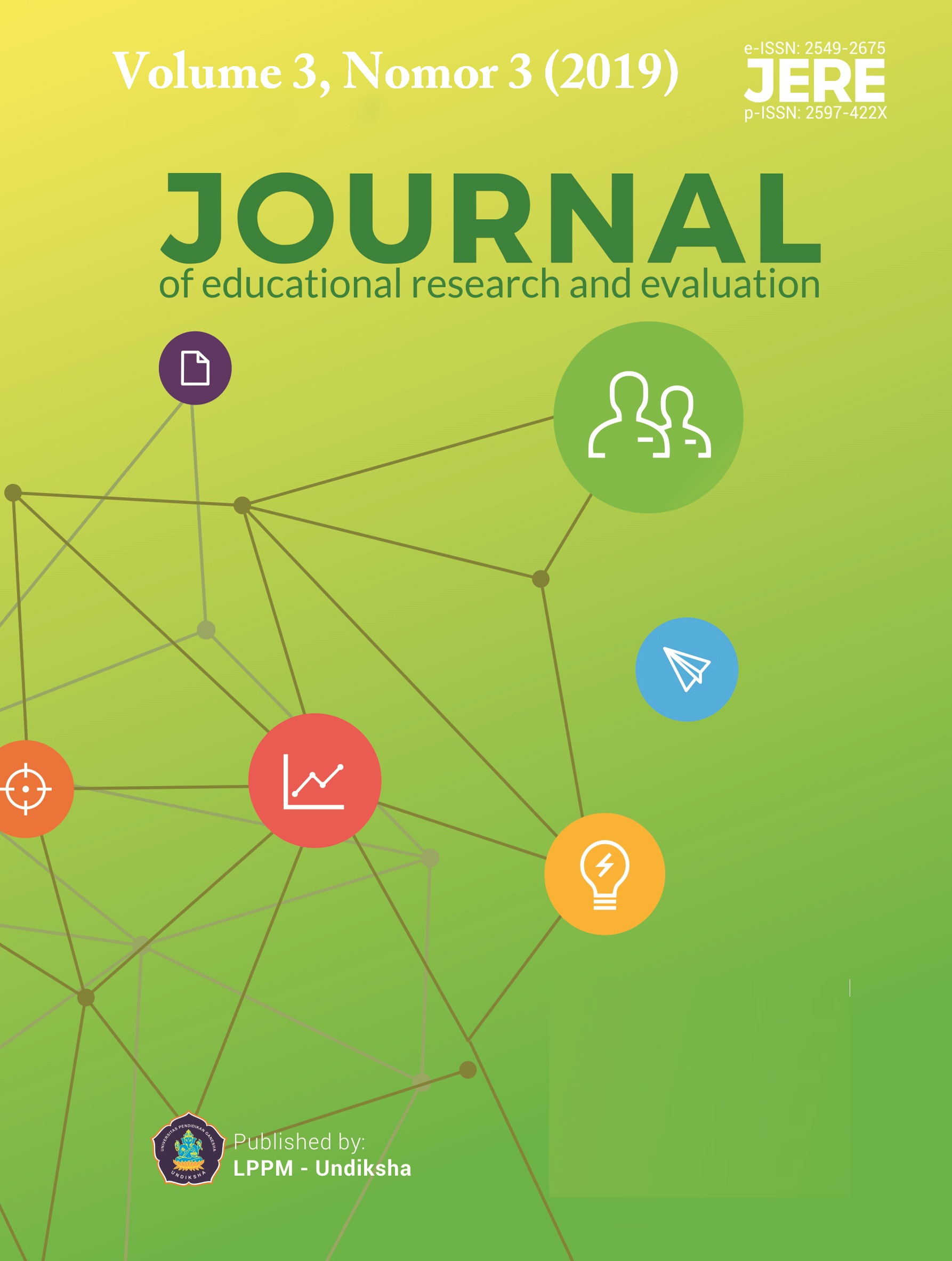The Effectivity of TPS Type Cooperative Learning Model Based on Interpersonal Intelligence Toward Mathematical Knowledge Competencies
DOI:
https://doi.org/10.23887/jere.v3i3.21856Keywords:
Think Pair Share, Interpersonal Intelligence, MathematicsAbstract
This study aimed to find out the effectiveness of cooperative learning model of the Think Pair Share type observed from interpersonal intelligence toward Mathematical competency on the fourth grade at SDN Moh. Hatta in academic year of 2018/2019. This study was a quasi-experimental design with 2 x 2 factorial design. The population of this study were 244 students on the fourth grade of SDN Moh. Hatta in academic year of 2018/2019. The sample technique used in this study was purposive sample.The data were collected using test and non-test methods. The data were analysed using 2-lane variance analysis. Based on the results of the analysis, it is obtained that (1) FA hitung = 7,002 > F tabel (α = 0,05; 1;76))= 3,967. Therefore, the null hypothesis (H0) is rejected. It signifies that “there is a significant difference in Mathematical competency between group of students who are taught through cooperative learning model of Think Pair Share type and group of students who are taught using conventional learning”, (2) FB hitung = 0,041 < F tabel (α = 0,05; 1;76)) = 3,967. Therefore, the null hypothesis (H0) is accepted. It means that “there is no significant difference in Mathematical competency between students who have high interpersonal intelligence and students who have low interpersonal intelligence”, (3) FAB hitung = 0,902 < F tabel (α = 0,05; 1;76))= 3,967. From the last results, the null hypothesis (H0) is accepted. It means that “there is no significant interaction between cooperative learning model of Think Pair Share type and interpersonal intelligence on Mathematical competency. The results of the treatment effectiveness calculation obtained the score of 14η2=0.083"> . Overall, it can be concluded that the application of the learning model has an influence on the Mathematical competency by 8,3%References
Huda, Miftahul. 2013. Model-model Pengajaran dan Pembelajaran : Isu-isu Metodis dan Paradigmatis. Yogyakarta : Pustaka Pelajar.
Olejnik, Stephan. 2003. “Generalized Eta and Omega Squared Statistics: Measures of Effect Size for Some Common Research Designs”. The American Psychological Association, Inc, Volume 8, Nomor 4 (hlm 435). (diakses pada tanggal 20 Januari).
Permendikbud. 2014. Peraturan Menteri Pendidikan dan Kebudayaan Republik Indonesia Nomor 57 Tahun 2014 Tentang Kurikulum 2013 Sekolah Dasar/Madrasah Ibtidaiyah. Jakarta : Kemendikbud.
Riduwan. 2008. Metode & Teknik Menyusun Tesis. Bandung : Alfabeta.
Safaria. 2005. Metode Pengembangan Kecerdasan Interpersonal Anak. Yogyakarta : Amara Books.
Tuckman, B.W.1999. Conducting Education Research. New York : Harcourt Brace Jovanivich.
Downloads
Published
How to Cite
Issue
Section
License
Authors who publish with the Journal of Evaluation and Research in Education (JERE) agree to the following terms:
- Authors retain copyright and grant the journal the right of first publication with the work simultaneously licensed under a Creative Commons Attribution License (CC BY-SA 4.0) that allows others to share the work with an acknowledgment of the work's authorship and initial publication in this journal.
- Authors are able to enter into separate, additional contractual arrangements for the non-exclusive distribution of the journal's published version of the work (e.g., post it to an institutional repository or publish it in a book), with an acknowledgment of its initial publication in this journal.
- Authors are permitted and encouraged to post their work online (e.g., in institutional repositories or on their website) prior to and during the submission process, as it can lead to productive exchanges, as well as earlier and greater citation of published work. (See The Effect of Open Access)











